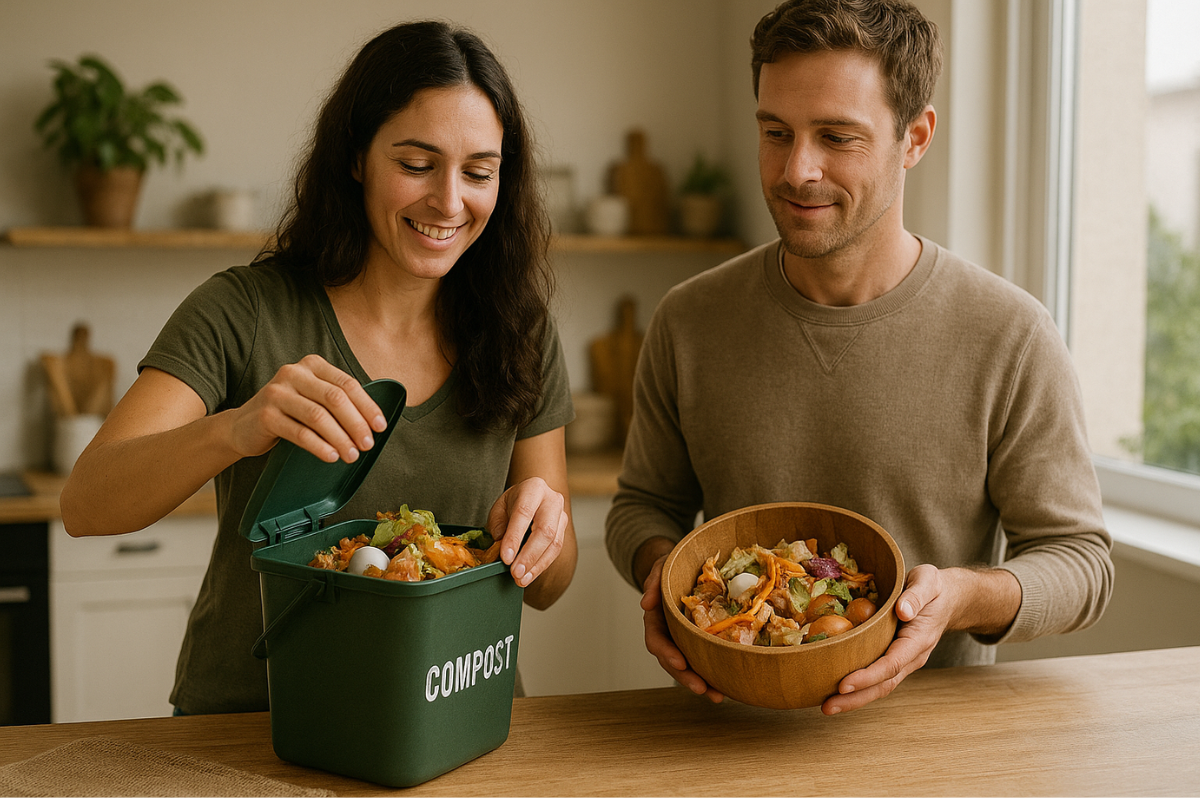Composting is one of the most impactful things you can do for the environment from the comfort of your home. It reduces the amount of waste sent to landfills, cuts methane emissions, and creates nutrient-rich soil to feed your plants. The best part? It’s much easier than you think.
This beginner’s guide walks you through exactly how to start a compost system that suits your space—whether you live in a house with a backyard or a small apartment.
Why Composting Is Worth It
Composting transforms food scraps and organic waste into natural fertilizer. Instead of sending valuable nutrients to rot in a landfill, you can return them to the earth.
Benefits of composting:
- Reduces household waste by up to 30%
- Lowers greenhouse gas emissions
- Improves soil quality for gardening or potted plants
- Saves money on store-bought fertilizers
- Fosters a circular, sustainable lifestyle
What Can Be Composted
Green materials (rich in nitrogen):
- Fruit and vegetable scraps
- Coffee grounds and filters
- Grass clippings
- Tea bags (check if compostable)
Brown materials (rich in carbon):
- Dry leaves
- Shredded paper or cardboard
- Egg cartons
- Sawdust and wood chips
- Toilet paper rolls
The right balance between green and brown is key to avoiding bad smells and maintaining healthy compost.
What to Avoid in Your Compost
Not everything organic belongs in compost. Some items can attract pests or introduce harmful bacteria.
Do not compost:
- Meat or dairy products
- Oily or greasy foods
- Animal waste
- Diseased plants
- Synthetic materials (like plastic or foil)
Choose the Right Composting Method
Depending on your home setup, there are different ways to compost effectively:
1. Outdoor Compost Bin or Pile
Best for: Homes with yards
- Use a plastic or wooden bin with a lid
- Layer greens and browns
- Turn the compost weekly to aerate
- Finished compost is ready in 2–4 months
2. Indoor Compost Bin
Best for: Apartments or homes without outdoor space
- Choose a bin with a charcoal filter to control odor
- Mix greens and browns, and stir occasionally
- Empty the bin into a community compost program or drop-off location
3. Vermicomposting (Worm Composting)
Best for: Indoors or balconies
- Use a special worm bin and red wiggler worms
- Feed them weekly with small food scraps
- Worms process waste quickly and produce rich compost
How to Maintain a Healthy Compost
Keeping your compost healthy means maintaining the right balance of materials and moisture.
Golden rules:
- Keep it damp: Like a wrung-out sponge
- Add more browns if it smells bad
- Add more greens if it looks dry or slow
- Turn it regularly to speed decomposition
With the right conditions, nature does most of the work for you.
What to Do With Finished Compost
When your compost looks like dark, crumbly soil and smells earthy, it’s ready to use.
How to use it:
- Enrich garden beds or vegetable patches
- Add to potted plants or containers
- Mix with soil for new plantings
- Give it away to gardening friends or community gardens
Avoid using immature compost—if it’s still warm or smells sour, give it more time to break down.
Troubleshooting Common Issues
If your compost isn’t working as expected, here’s what to check:
| Problem | Cause | Solution |
|---|---|---|
| Foul odor | Too many greens, not enough air | Add browns and mix well |
| Compost too dry | Not enough greens or water | Add moist food scraps or water |
| Pests or flies | Wrong materials or exposed scraps | Bury food deeper, cover with browns |
| No decomposition | Not enough heat or moisture | Move to sunny area, moisten pile |
Composting in Small Spaces
If you live in an apartment, don’t worry—you can still compost successfully.
Urban composting ideas:
- Join a community garden with a compost system
- Use a countertop bin and drop waste at local compost hubs
- Try a Bokashi system (ferments waste for later burial)
- Keep a small worm bin under your sink or on a balcony
Start Where You Are
You don’t need a perfect system to get started. Composting is about building a relationship with your waste and the earth. Each banana peel and coffee filter you compost is one less item in a landfill and one more step toward a healthier planet.
Whether you start small indoors or go all in with a backyard bin, composting connects you with nature in a meaningful, rewarding way.
